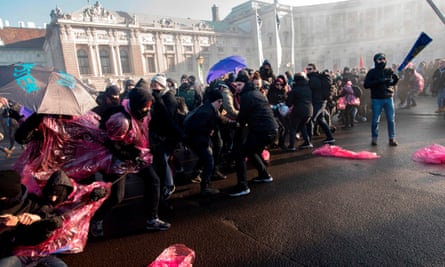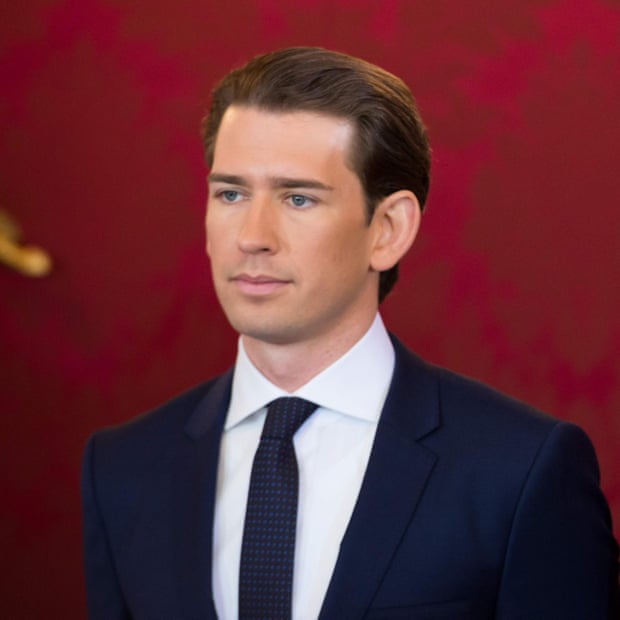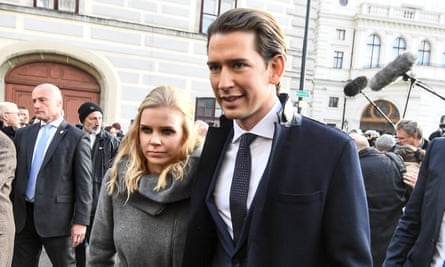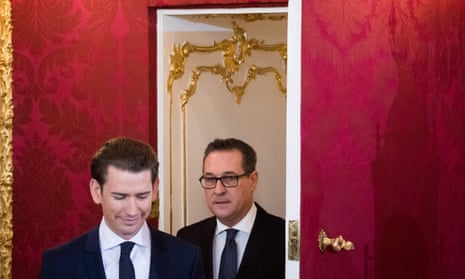Austria’s president has sworn in a new government amid muted protests against the far right’s prominent role in the cabinet.
At the weekend the new chancellor, Sebastian Kurz, of the Austrian People’s party, struck a deal with the Freedom party, a nationalist group founded after the second world war by former members of the Nazi party and now headed by Heinz-Christian Strache.
The coalition deal makes Austria the only western European country with a far-right presence in government. At 31, Kurz is the youngest head of government in the world.
Kurz’s People’s party won 32% of the vote in October’s elections, securing 62 seats in the 183-seat national council. The Freedom party came third with 26% of the vote and 51 seats.

Police estimated that about 5,500 people attended protests in Vienna on Monday – a far lower number than the tens of thousands who turned out the last time the Freedom party entered government. On 19 February 2000, 150,000 Austrians took to the streets of Vienna to protest against the incoming government.
On Monday, a heavy police presence of about 1,500 officers, helicopters and water cannon trucks blocked off the area around Hofburg Palace in the run-up to the swearing-in ceremony conducted by the Austrian president, Alexander Van der Bellen.
As marches by students, feminists and anti-fascist groups converged at the central Heldenplatz Square, people brandished placards that read “Refugees welcome”, “Nazis out” and “No Nazi pigs”.
Q&AHow did Sebastian Kurz rise to power?
Show

The 31-year-old turned around the fortunes of the Austrian People’s party (ÖVP), which had been trailing in polls before he was announced as its candidate for chancellor in June.
Kurz made his candidacy conditional on an overhaul of his party’s selection processes. Although the ÖVP has been in government continuously for 30 years and Kurz is one of the cabinet’s longest serving ministers, he had the chutzpah to run his campaign on a platform of change, including the slogan “time for something new”.
Critics argue that Kurz’s rise has come at the cost of embracing a divisive agenda dictated by the nationalist right. Throughout his campaign, he consistently reminded voters of his role in closing down the Balkan route for refugees moving into Europe last year, as well as his drive for a "burqa ban" that came into force in October, the month of the election.
Kurz’s supporters, however, have praised him for developing a new strategy for coping with the aggressive and media-savvy nationalist right. After years of politicians from the two centre parties criticising the far-right FPÖ’s rhetoric only to then embrace its policies, Kurz was more proactive, by emphasising international solutions for domestic problems.
Police fired a smoke grenade when some protesters tried to break through a barricade, an Agence France-Presse photographer said.
Van der Bellen, who had previously said he would not swear in a government led by the Freedom party, prefaced Monday’s inauguration ceremony with only mild words of warning.
He appealed to Kurz and Strache to exercise a respectful and civilised leadership and to heed the rights of minorities. “Our treatment of the weakest in society reveals what our values are really worth,” he said.
Donald Tusk, the Polish president of the European council, said he looked forward to welcoming Kurz in Brussels. “I trust that the Austrian government will continue to play a constructive and pro-European role in the European Union,” he said.
One of the few critical reactions came from the United Nations, whose rights chief said that Austria’s rightward lurch marked a “dangerous development … in the political life of Europe”.
“I am very worried,” the UN’s high commissioner for human rights, Zeid Ra’ad al-Hussein, told AFP.
The last time the Freedom party entered a coalition government, in 2000, the move was met with sanctions and outrage from Israel and across the EU.The coalition treaty agreed by the two parties vows to restrict illegal immigration and speed up deportation of refused asylum seekers, but also emphasises the state’s commitment to EU membership.
“This is a coalition of two parties who want to actively shape Europe,” Kurz told Austrian TV over the weekend.
A referendum on the issue of Austria leaving the EU, previously suggested by the Freedom party, has been explicitly ruled out.

Kurz’s chancellory will oversee European affairs, and the foreign ministry post has been filled with an independent Middle East expert nominated by the Freedom party, Karin Kneissl.
The Freedom party will control key posts in the new government, including the interior and defence ministries. Norbert Hofer, narrowly beaten by the Green-backed Van der Bellen in the presidential election in December 2016, will be in charge of infrastructure.
The new interior minister, Herbert Kickl, a former speechwriter to the Freedom party’s ex-leader Jörg Haider, is the author of widely criticised campaign slogans such as “More courage for Viennese blood” and “Daham statt Islam” (“Home instead of Islam”).
Kickl’s party and the Austrian People’s party have identified cash payments for asylum seekers as one of the key pull factors for illegal immigration into Austria: they plan to reduce benefits to €365 per month, with a top-up of an additional €155 “integration bonus”.
Critics warn that switching to non-cash benefits could significantly increase state expenses in other areas, such as housing.
Under rules proposed by the new government, those applying for asylum in Austria will also be required to allow authorities to access their mobile phones to verify their identity and migration routes, and hand over cash they have on them to fund their welfare.
Trades unions and politicians from Austria’s Social Democratic party have criticised the new government’s commitment to relaxing restrictions around working hours. The two parties plan to raise the maximum working day from 10 to 12 hours and the maximum working week from 50 to 60 hours.
“International comparisons show that the more progressive the location, the more flexible the working arrangements,” states their manifesto.
While Kurz’s People’s party and the far right have agreed to expand voter participation in legislative matters, their plans do not match up to the Swiss model of “direct democracy” in the way the Freedom party had originally intended.
Under their proposals, petitions with more than 100,000 signatures would be treated as legislative initiatives with guaranteed speaking time in national parliament. But a decision on whether such initiatives could also lead to national referendums has been postponed to 2022, the end of the coming legislative period.
Even in its curtailed form, however, the plans could soon come back to bite the new government. A petition calling on Kurz to reinstate the smoking ban, which his government has decided to scrap, has already gathered more than 300,000 signatures.
